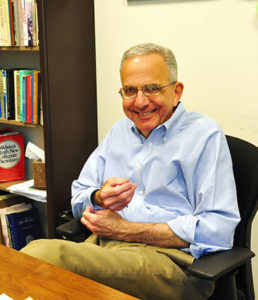Becky Wrenn

Ronald Hoffman was the longest serving director of the Omohundro Institute.
Below are remembrance from colleagues. To share a remembrance of Ron, please contact Martha Howard (mxhowa@wm.edu).
From Becky Wrenn
Ron was a brilliant storyteller. That’s part of what made him such a great historian, but this talent wasn’t limited to academics. At the drop of a hat, he could whip out a relevant tale on virtually any topic, the most entertaining of which involved his own borderline-unbelievable adventures. Even better than hearing a Ron story was living one—a road trip with him and Sally featuring his legendary(?) driving skills, a midnight trip to the E.R. in (fittingly!) Carroll County, an experimental hiccough cure gone wrong in a Glasgow pub.
As accomplished as Ron was, he never took himself too seriously, and despite his own remarkable record of professional achievements, he treated all of us as equals, regardless of title, age, or background. In the (often) highly competitive and hierarchical ivory tower, this was especially impressive and very much appreciated. He was the type of boss (and person), whose sense of camaraderie inspired fierce loyalty and who gladly went to bat for us whenever we needed it. Meanwhile, his dry and understated goofy streak could liven up an otherwise dull and dreary day. The Institute thrived under his leadership, but it also felt like a family.
Perhaps Ron’s only real Achilles heel was his computer. He called me into his office one May afternoon to inform me that his computer wouldn’t turn on. “That’s because that’s a box of Quarterlies covered in printer paper. I drew buttons on it,” I told him, pointing to the “Happy April Fool’s Day, Ron!” scrawled across the “on button.” In his defense, this was in the days of big, bulky, under-the-desk CPUs, and Ron didn’t see the need to turn on his computer very often. As intimidating as he may initially have appeared in, say, a grad class with an infamous 500-page-per-week reading load, he could also appreciate the absurdity of a cardboard computer. He made the Institute the type of place where intellectual inquiry could be paired with wit, glee, and mutual respect. For the record, he did eventually come to appreciate his real computer, which had spent that April lounging in plain sight under his book display table.
After 6:00 or so, Ron would often pull a Mr. Rogers, changing into his beloved U.S.S. Newport News shirt (his first Internet purchase), and then spend another few hours working, sometimes with a brief break to catch up on the latest Daily Show clips. Together, Ron and Sally had an encyclopedic knowledge of the best (or really, the only) Williamsburg restaurants that served decent nachos and acceptable Caesar salads past ten o’clock, and in the rush to finish the first three volumes of the Carroll Papers, I often joined in their near-midnight post-work dinners. To me, these were welcome opportunities to pick their brains and trade more stories.
I worked for the Director’s Office, the WMQ, and the Carroll Papers, took his legendary Revolution grad class, tagged along on conferences and trips, sublet his Colonial Williamsburg house, and regularly pestered him for advice on and off over the last twenty-five years, but one of my favorite stories about Ron is from way back in the late nineties. He wandered into the Institute library one afternoon to find Kim Foley and I sobbing and surrounded by Carroll letters. When he found out the reason—that Charley Carroll had just learned “Mama” had died a few weeks earlier—Ron very seriously asked, “you do know she died over two hundred years ago, right?” But he also got it. He cared deeply about the Carrolls, and about the two distraught employees who were just getting sucked into the Carroll story. That story—and the way he and Sally told it—was compelling enough to lure me back to the Carroll Papers two years ago, because the opportunity to work with them again was too great to pass up. A few months ago, I finally reached the letter in which Charley died. This time I knew it was coming, so I chickened out and made my six-year-old (who called Ron “Uncle Ron”) read it to me. And through the sniffles, I could picture Ron asking us both, “You do know he died nearly two hundred years ago, right?” But still, I know he’d get it, because as a master storyteller, he understood the power of getting wrapped up in the lives of the past and in creating new adventures in the present.
Ron was my boss, my professor, my landlord, my friend, and an honorary member of my family, and my career, education, and life are all the better for it. I thank him for the stories, and I will deeply miss hearing and sharing in new ones.
Becky Wrenn
